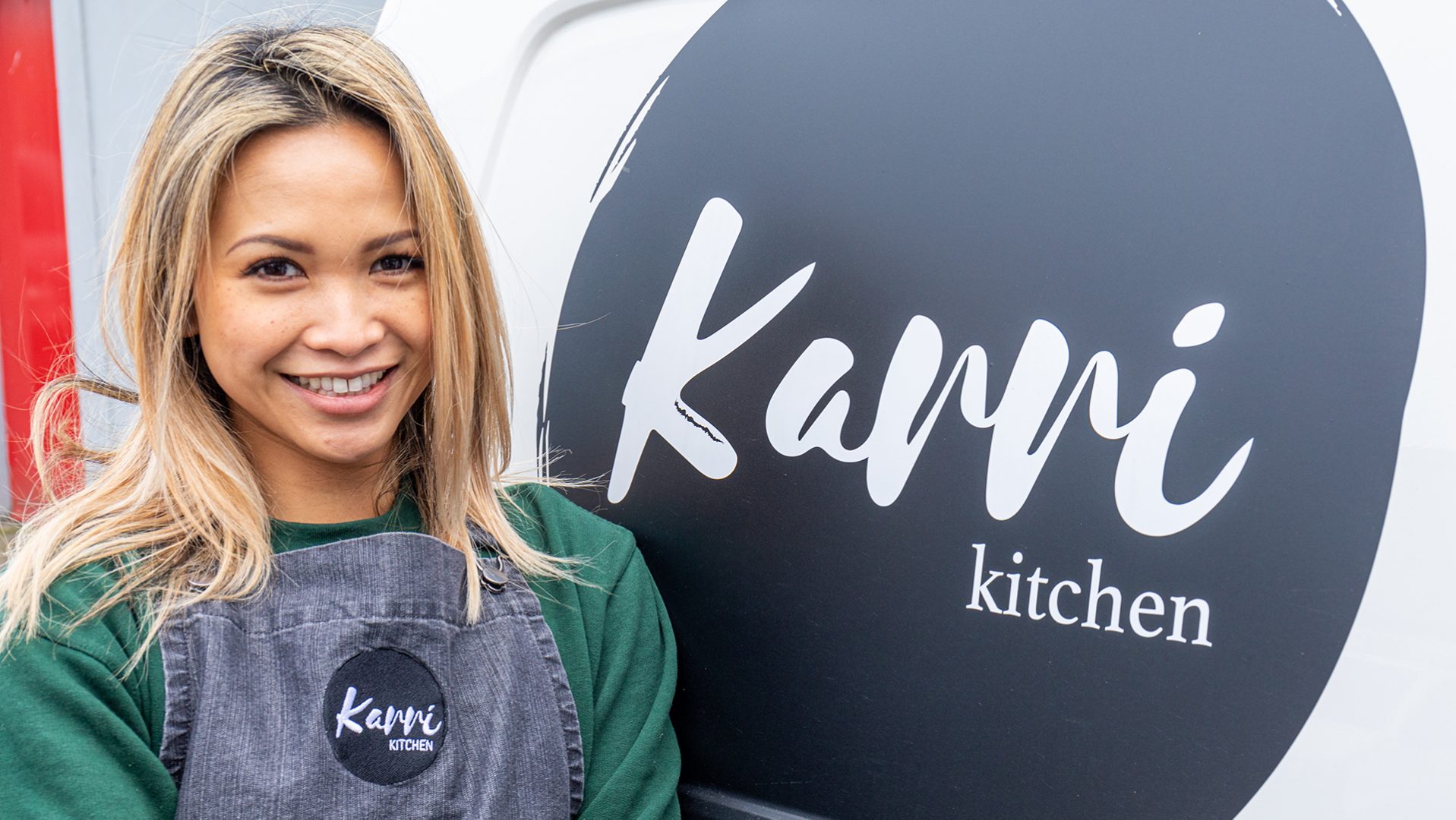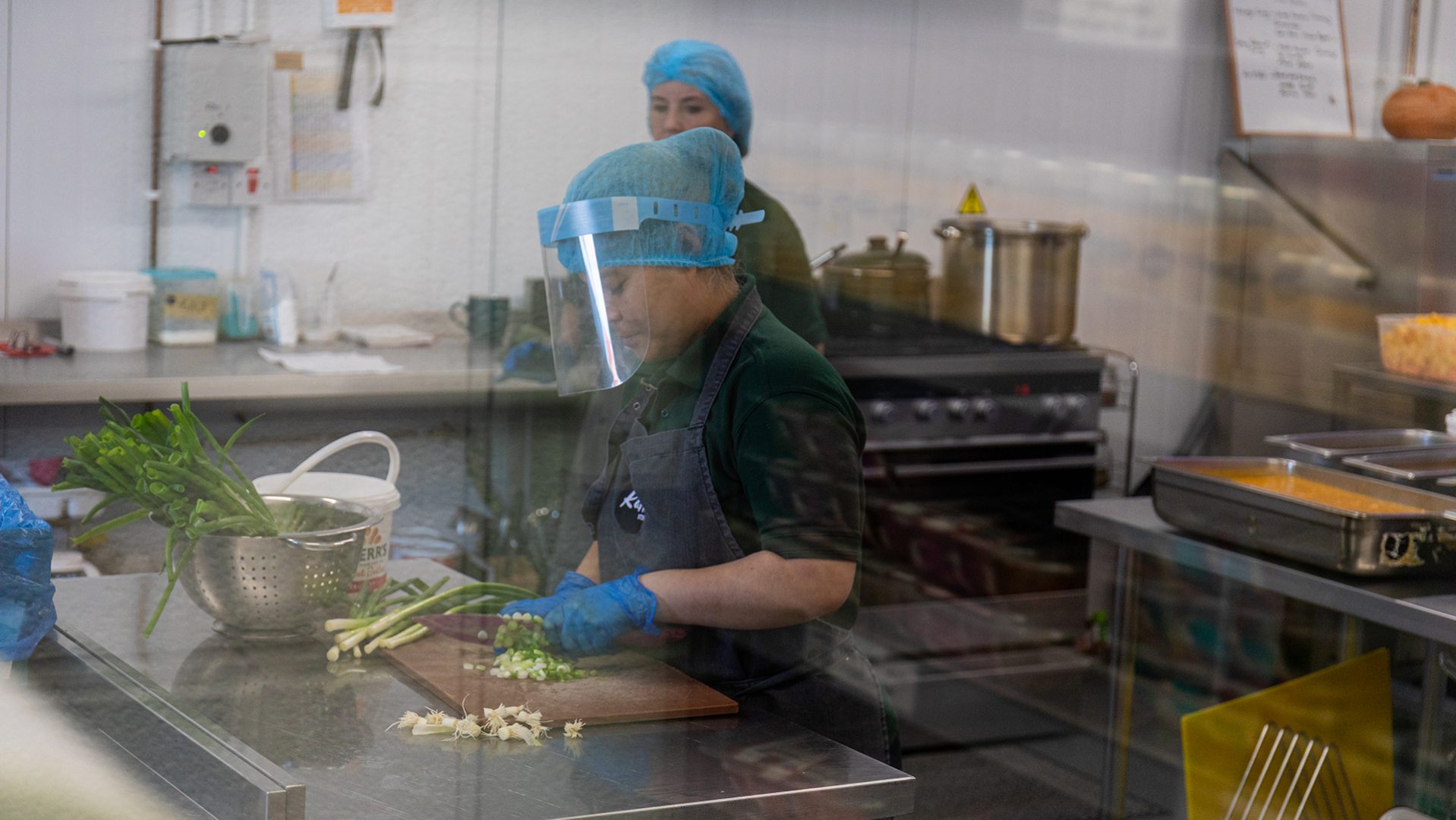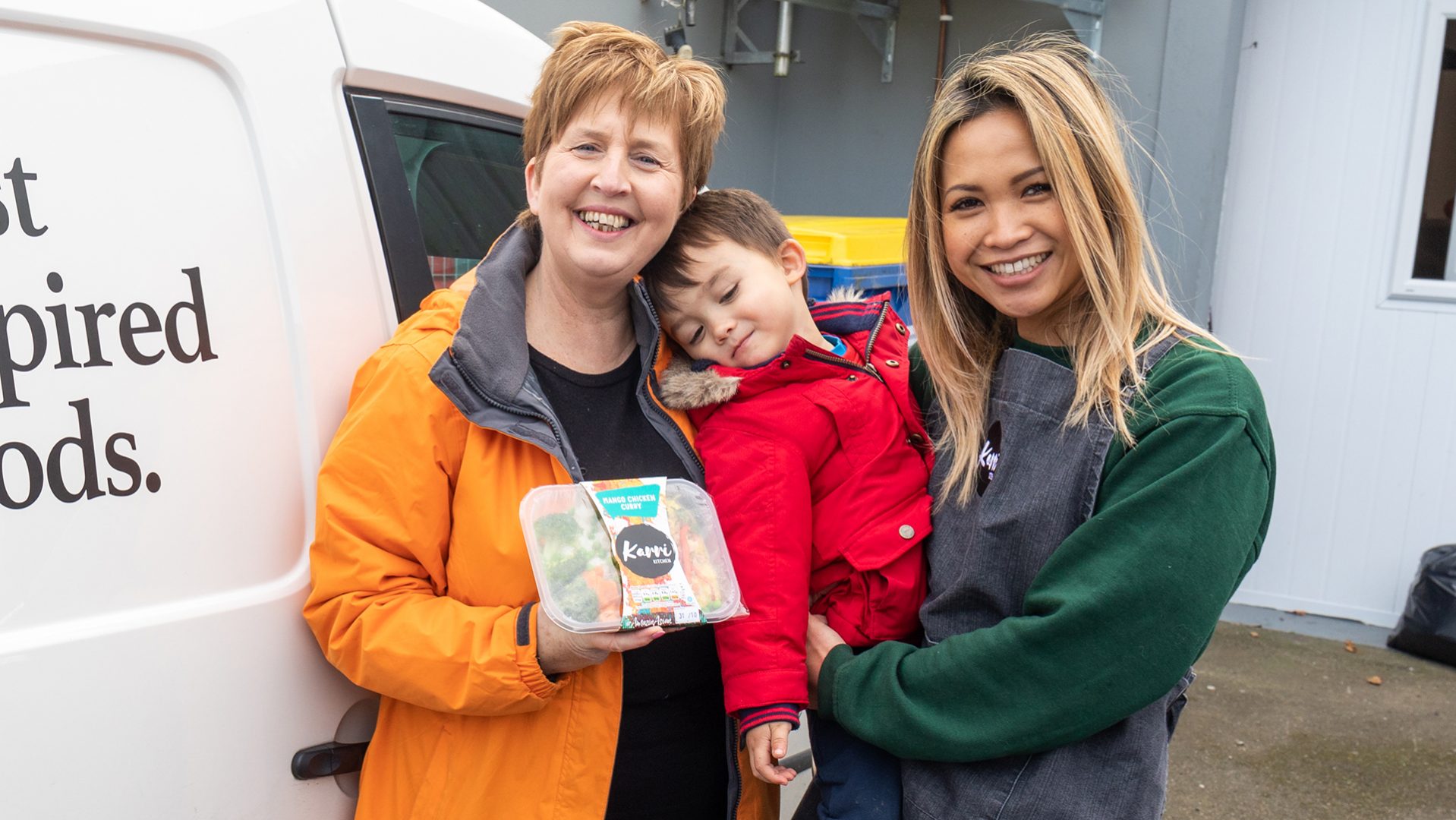If I’m an advocate for anything, it’s to move. As far as you can, as much as you can… Walk in someone else’s shoes or at least eat their food. It’s a plus for everybody.
Anthony Bourdain
When you hear ‘Portadown’, what’s the first thing that comes to mind? It’s probably not young, successful, Indonesian, female entrepreneur, but that’s exactly who Shera McAloran is. As Owner and Chef of Karri Kitchen, she is not only elevating Asian cuisine in her wee corner of County Armagh, but is also proving that ready-made meals can be healthy, fresh and sustainable.
Here’s what she had to say:
Tell us about yourself
I’m originally from Jakarta, Indonesia. I worked in Sydney for twelve years, where I ran an organic coffee shop. My husband is from Portadown, so that’s how I ended up here.
Upon landing in Northern Ireland, I had no idea what I was going to do. I was fed up with hospitality – it’s so easy to get burnt out if you’ve ‘been through the wars’, and I have. I really didn’t want to go back to it – ever! I was working 60 hours a week and constantly dealing with customers face-to-face. I wanted something different.
Wait a second – you chose Portadown over Sydney?
It’s not the first time I’ve heard that question!
When I was young, Sydney was brilliant. It’s a city for young people. We wanted to have a kid and our hours in and out of restaurants were not conducive to raising one.
Whenever I first visited here, it was a really sunny day and that whole summer was just amazing. I thought to myself, why would you ever leave this island?
That deceptively short stint of good weather aside, people are friendly. You can just talk to them on the street – that would never happen in Sydney! You get a real, authentic connection to people here. I enjoy it and I am happy to call this place home.
How did Karri Kitchen get its start?
Well, when we had our first child, I thought I’d be OK not working, but that didn’t last long. I wanted to find something that was fulfilling yet offers a stable schedule so that I could be there for my son.
I started having friends over on the weekends, especially when I was pregnant, as I needed something to do and I wanted people around. We started hosting a weekly ‘Come Dine with Me’ event. It started one Christmas and snowballed from there.
I’d make a big pot of curry and our local friends would go crazy over it. We then started doing BBQ nights, but people just kept demanding curry.
Pretty soon people were asking, “Can you cook for me? I’ll pay you!” That started as a one-off thing and then people had me cooking and doing meal preps on a weekly basis.
So, it all started in your kitchen?
Yep! I was cooking for our next door neighbour and he tagged my food in a Facebook post and, all of a sudden, I’m getting messages from people I’ve never met before! They were asking how they could place orders:
“Give us two chicken curries! Do you do half and halves? Ah well, we’ll take the chow mein, too!”
I was like, “What is happening?! Who are you people? I only just moved here!!!”
So that’s how it started. The demand quickly outgrew the capacity of my kitchen, so we have our spot here in the business park and employ a full time staff.
We never really advertised beyond our Facebook and Instagram pages. People were able to order through them and it just grew organically through word of mouth. You can now order by contacting us through our website.
Why Karri Kitchen?
It is so hard to find true, authentic, healthy Asian cuisine. Maybe Belfast has some variety, but, once you get outside of it, it’s very hard to find.
Where I’m from in Indonesia, the native food is excellent, but so is the rest of the Asian cuisine that’s offered there. You can find some of the best Chinese food in the world in Indonesia. It’s the same in Sydney.
In Portadown, you have a small selection of places to eat. In the last couple years, I’ve noticed people are getting more adventurous with food. Some of our regulars would have their ‘go to’s’ at first, but they are branching out across our menu now.
One thing that surprised me – I couldn’t believe places were selling kung pao chicken with chips. Really?!
It was an adjustment. I’ve had to have quite a few conversations with locals on why we don’t sell chips.
Generally speaking, it’s very hard in Northern Ireland to find dishes that contain the core ingredients of most Asian cuisines.
I really just want people to have a good understanding of Asian food. If I can do that, I’ve done my job.
Is there a story behind your dishes?
They are all favourite dishes from home. The chow mein chicken noodles are my dad’s favourite and it’s my mom’s recipe, as most of our dishes are. The mango chicken curry was my mom’s signature dish at home. Our food always brings me back to her kitchen.
We use all the same sauces and ingredients I would have used growing up in Jakarta. I wouldn’t be prepared to call a dish by its name if it wasn’t authentic. Food evokes emotion – a nostalgia – and you can’t get there by cutting corners.
Due to Covid, I haven’t been home for two years, so the food brings me much comfort.
Tell us about your operation
We mostly do ‘direct sales’ – people come by and collect what they’ve pre-ordered. Our pre-made meals are now stocked in eleven shops throughout NI, mostly in Spar’s, Nisa’s and other local markets in the Portadown-Armagh area. We plan to continue to expand.
How are you keeping things ‘local’?
Our meat is sourced from M&W Farm Meats here in Portadown. We were selling out so quickly we had to increase our orders. Our broccoli is supplied by one of our neighbours. The carrots come from the other side of Armagh. Everything is locally sourced and we’ve made it a point to approach local farmers for our products.
We’ve also worked with the Southern Regional College to produce sustainable packaging and aid us in properly storing our products. I had plenty of experience in hospitality, but not so much on the food production and ‘shelf life’ side of things, so they were instrumental to our success.
It’s great to be able to support other local producers as we continue to grow. In Northern Ireland, there’s amazing local products, but they’re rarely used locally!
How have you adapted to Covid-19?
In many ways, Covid has made us. We had to get creative and, while providing delivery and collection services, it just so happened that the products we have available were in high demand during the pandemic. Luckily, we don’t have the overheads of a traditional restaurant to worry about and we aren’t dependant on ‘getting customers through the door’. I think our convenient, yet healthy meals are very appealing to people. Striking that balance between accessibility and nutrition has been our calling card.
Even compared to traditional takeaways, our approach is less costly and holds a longer shelf life. People go to restaurants for the whole experience. I think the idea of getting takeaway from their favourite places to ‘go out’ to isn’t the same feeling. In contrast, with us, they get authentic, restaurant-quality cuisine and can have it whenever they want.
Is health a focus?
Yes. The Southern Regional College helped us construct our meals. We discussed how to balance nutrition alongside shelf life. All of our meals are under 500 calories, yet they fill you up. You get your carbs from carrots and broccoli and our other fresh vegetables. Some of our meals have rice, but you don’t need a lot of rice to feel full. We don’t have any preservatives in our meals other than what may be in some of the sauces we use, which, again, are traditional.
Our shelf life is very short compared to other ready-made meals. I’m not going to sub out quality ingredients so that our products last longer. I eat this food every day, too. It’s the same food I would entertain guests with and cook for my family, so the quality can never be compromised. All of the ladies who work in here are passionate about food and home cooking themselves, which adds more to the story behind the food.
You can’t trust people who make food they wouldn’t eat.
Would you consider opening a cafe in normal times?
I said I wanted to stay away from the hospitality industry, but look at us!
Yes, I’d like to have a healthy eatery at some point – something that resembles the world-famous food halls of Southeast Asia, where people can come in, be themselves and eat comfortably and affordably – something that brings people together.
Is your quality of life better than in previous hospitality work?
Absolutely! Work-life balance is essential for us. The hours in this industry are poor – you’re asked to sacrifice so much for so little. We only work from 7:30am – 3:00pm each day. There aren’t many places that can guarantee a rock solid schedule that you can depend on.
I want our ladies to have a life outside of this place – I want a life outside of this place. And I think this ensures the highest quality production while remaining human. Being overworked leads to poor production and, ultimately, you’ll resent your work, and that’s the last thing I want to experience again.
How has the local community taken you in?
Nobody really knew about Indonesian food or most of Southeast Asian cuisine previously; they had really only tried Chinese food. We brought with us something different. Now we have people driving from nearly an hour away to pick up their orders.
More local people are getting interested in experimenting with different flavours and cooking styles. Portadown is actually a very diverse place, so I think what we’re doing is getting people curious about cuisines from other migrant communities that live here, too.
Is there a philosophy behind the food?
I believe in healthy, balanced meals. That means you’re getting enough vegetables, carbs and protein. You don’t need excess, but you also don’t need to cut corners that, yes, may bring your calorie count down, but also makes the food ‘empty’ and artificial. If you’re getting 500 calories from one of our meals, you can guarantee that all 500 of those calories are from fresh, local ingredients.
Why would you eat something characterised with words fit for a secondary school science experiment? If you’re squeamish about food, these are the ingredients you should be avoiding.
Listen to your body – it knows what’s good for you.
Is there a significance behind your designs?
The pattern on our boxes is called batik – it’s a traditional Indonesian pattern. When we’re born, our parents give us our own batik.
The different patterns on our dishes represent my siblings’ batiks. The patterns reflect our work ethos and our dedication to family. It symbolises where I come from and is resonated in our dedication to the work we continue to pursue as a proud, Portadown family.
What’s your message for the community at this time?
‘Mon out to Portadown and enjoy some authentic, “Amazin’ Asian” cuisine!



